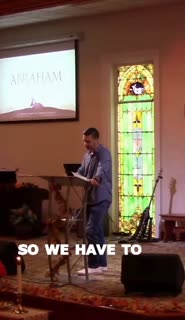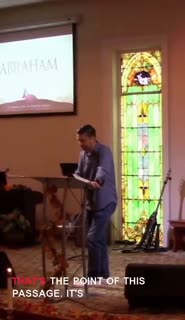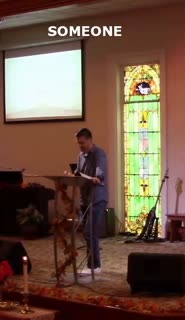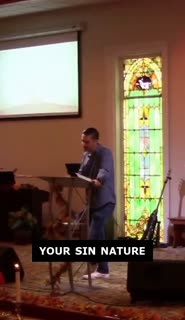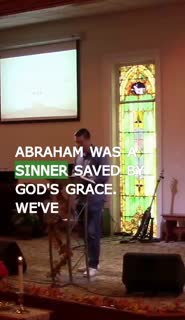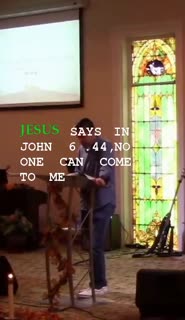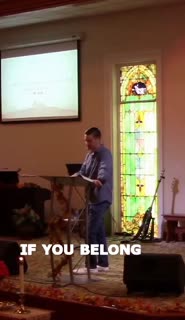Faith in God's Grace: Overcoming Sin and Embracing Identity
Devotional
Sermon Summary
Bible Study Guide
Sermon Clips
1) "So we have to remember that Scripture, it's not about Abraham. It's not about any other man or woman we read about other than Jesus. It's not about Jesus. All Scripture. It's meant to... It's meant to point us to the one that offers us something that we can't provide ourselves. And the message this morning, it's communicating to us that we're all sinners and without Jesus' saving work, we're all hopelessly doomed. Abraham's not the hero of this story. And I believe as we come to Genesis 20 this morning, that's the point of this account. Abraham was obviously a great man. There's plenty of things we should strive to emulate in him. But guys, Abraham, just like all of us, he was a man under the curse of sin. And even as someone set apart, he struggled with the flesh at times." [39:13] (54 seconds)
2) "That's the point of this passage. It's to point us to Christ. It's meant to show us that while we're all still prone to fall, God remains faithful to those he's reconciled to himself. And he'll do everything to preserve that which he's given new life. This passage, while it seems discouraging as you walk through it at surface level, it's meant to be an encouragement for those that belong to Christ. It's meant to show us where our hope and where our confidence is. It's not in us. It's not in any man or woman that we realize. Read about, it's in Christ alone." [40:05] (35 seconds)
3) "Someone asked me recently what I believe the greatest problem facing the church is today. You know what I told them? Pastors. Too many pastors have forsaken their biblical mandate to preach the word. That's all that pastors are called to do. Preach the word. Do it faithfully. Do it in a way that you show your people that you trust every inspired word that you have. And that's what I believe. To be from God. Preach the whole counsel of God's word. Not parts of it. Teach that it's sufficient, that it's powerful." [49:18] (40 seconds)
4) "If you acknowledge your sin nature and if you recognize your susceptibilities to fall into old sins what's going to give you power over your sin it's not going to be you guys it's not going to be your abilities it's not going to be your willpower guys pay attention here the only thing that kept sin from festering here it was who it was god's power he's the only one that has power over sin that's why paul says in romans 8 21 there there is therefore now no condemnation for those who are in christ jesus so listen if you're seeing no change in your habits if you're not seeing any improvements it might be you're relying on the wrong source of power god is the only one that can overcome sin he's the only one that can give you victory over sin." [54:23] (52 seconds)
5) "Abraham was a sinner saved by God's grace. We've seen this over and over again. And while there were noticeable changes in his life, him and Lot, they faced the same problem in the end. Their work couldn't save them. And guys, their work couldn't maintain them. The point of this passage is that salvation belongs to the Lord. And the perseverance of one's faith, it belongs to the Lord. Why? Because as long as we exist in this fleshly body, while we might grow spiritually, while we might grow in our knowledge and our love of God, we struggle with sin and with the flesh. That's just the truth of our lives." [01:06:35] (48 seconds)
6) "Jesus says in John 6 .44, no one can come to me unless the Father who sent me draws him. Meaning, coming to God, it requires God drawing us to him. One of my biggest pet peeves in the church is this statement when people are giving their testimony. It's when they say, when I accepted Jesus, when I made the decision to follow Jesus, salvation wasn't a decision or something that you did on your behalf. Right? We sing that song, Amazing. I once was blind, now I see. Why can you see? God uncovered it. God allowed you to see truth for truth. It wasn't of yourself. Your decision was sin. Your decision was rebellion. Your decision was death. That was your decision." [01:07:45] (47 seconds)
7) "If you belong to Christ, if there's evidence of that in your life, quit allowing your mistakes, guys, quit allowing your failures to cripple you. Quit fixating on the things that are bad about you. Acknowledge who you are. Accept it. Yes, you're a sinner, and yes, you make some really dumb decisions sometimes. It's okay. Confess your wrongdoing. Hopefully, you've surrounded yourself. Hopefully, within this church, you're going to be confronted with grace and not judgment. I mean, certainly accountability. We're all sinners. Confess your wrongdoings. Turn to the one that has power over sin. Trust in the one that actually has the power to preserve you to the very end." [01:15:01] (49 seconds)
Ask a question about this sermon
2) "That's the point of this passage. It's to point us to Christ. It's meant to show us that while we're all still prone to fall, God remains faithful to those he's reconciled to himself. And he'll do everything to preserve that which he's given new life. This passage, while it seems discouraging as you walk through it at surface level, it's meant to be an encouragement for those that belong to Christ. It's meant to show us where our hope and where our confidence is. It's not in us. It's not in any man or woman that we realize. Read about, it's in Christ alone." [40:05] (35 seconds)
3) "Someone asked me recently what I believe the greatest problem facing the church is today. You know what I told them? Pastors. Too many pastors have forsaken their biblical mandate to preach the word. That's all that pastors are called to do. Preach the word. Do it faithfully. Do it in a way that you show your people that you trust every inspired word that you have. And that's what I believe. To be from God. Preach the whole counsel of God's word. Not parts of it. Teach that it's sufficient, that it's powerful." [49:18] (40 seconds)
4) "If you acknowledge your sin nature and if you recognize your susceptibilities to fall into old sins what's going to give you power over your sin it's not going to be you guys it's not going to be your abilities it's not going to be your willpower guys pay attention here the only thing that kept sin from festering here it was who it was god's power he's the only one that has power over sin that's why paul says in romans 8 21 there there is therefore now no condemnation for those who are in christ jesus so listen if you're seeing no change in your habits if you're not seeing any improvements it might be you're relying on the wrong source of power god is the only one that can overcome sin he's the only one that can give you victory over sin." [54:23] (52 seconds)
5) "Abraham was a sinner saved by God's grace. We've seen this over and over again. And while there were noticeable changes in his life, him and Lot, they faced the same problem in the end. Their work couldn't save them. And guys, their work couldn't maintain them. The point of this passage is that salvation belongs to the Lord. And the perseverance of one's faith, it belongs to the Lord. Why? Because as long as we exist in this fleshly body, while we might grow spiritually, while we might grow in our knowledge and our love of God, we struggle with sin and with the flesh. That's just the truth of our lives." [01:06:35] (48 seconds)
6) "Jesus says in John 6 .44, no one can come to me unless the Father who sent me draws him. Meaning, coming to God, it requires God drawing us to him. One of my biggest pet peeves in the church is this statement when people are giving their testimony. It's when they say, when I accepted Jesus, when I made the decision to follow Jesus, salvation wasn't a decision or something that you did on your behalf. Right? We sing that song, Amazing. I once was blind, now I see. Why can you see? God uncovered it. God allowed you to see truth for truth. It wasn't of yourself. Your decision was sin. Your decision was rebellion. Your decision was death. That was your decision." [01:07:45] (47 seconds)
7) "If you belong to Christ, if there's evidence of that in your life, quit allowing your mistakes, guys, quit allowing your failures to cripple you. Quit fixating on the things that are bad about you. Acknowledge who you are. Accept it. Yes, you're a sinner, and yes, you make some really dumb decisions sometimes. It's okay. Confess your wrongdoing. Hopefully, you've surrounded yourself. Hopefully, within this church, you're going to be confronted with grace and not judgment. I mean, certainly accountability. We're all sinners. Confess your wrongdoings. Turn to the one that has power over sin. Trust in the one that actually has the power to preserve you to the very end." [01:15:01] (49 seconds)
